
Title: The French Exiles
Author: Margery Weiner
Published: 1960
A book about French Exiles in England written from the English perspective.
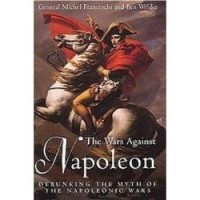
Title: The Wars Against Napoleon: Debunking the Myth of the Napoleonic Wars
Author: General Michel Franceschi & Ben Weider
Published: 2008
Popular and scholarly history presents a one-dimensional image of Napoleon as an inveterate instigator of war who repeatedly sought large-scale military conquests. General Franceschi and Ben Weider dismantle this false conclusion in The Wars Against Napoleon, a brilliantly written and researched study that turns our understanding of the French emperor on its head.
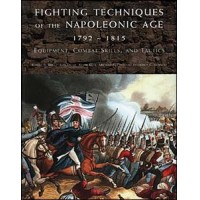
Title: Fighting Techniques of the Napoleonic Age: Equipment, Combat Skills, and Tactics
Author: Various
Published: 2010
A very useful tool for the reader who's not an expert on Napoleon, but who nonetheless wishes to know something about warfare during the era, at a nuts-and-bolts level. The book is divided into five chapters, covering infantry; cavalry; command and control; artillery, engineers and sieges; and naval warfare. Each of these chapters is lavishly illustrated with pictures, both color plates and black and white drawings. Each chapter includes a discussion of several battles, which illustrate what the text is saying.

Title: Men of Waterloo
Author: John Sutherland
Published: 1967
Tells the story of the Hundred Days that followed Napoleon's return from Elba
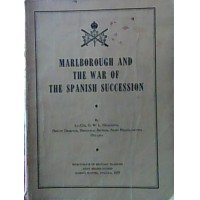
Title: Marlborough and the War of the Spanish Succession
Author: LT-Col. G. W. L. Nicholson
Published: 1955
Although not strictly a period book, this is one of three collectible books I acquired at a used book shop in Carleton place, Ontario. The other two are specific to the Napoleonic Era.
The Author was Deputy Director, Historical Section of Army Headquarters for the Canadian Forces. It was printed in 1955 by the Directorate of Military Training, Army headquarters, Queen's Printer, Ottawa.
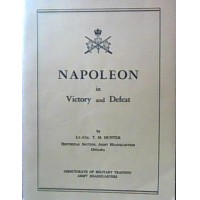
Title: Napoleon in Victory and Defeat
Author: LT.-Col T. M. Hunter
Published: 1964
This is the second of three collectible books I acquired at a used book shop in Carleton place, Ontario.
The Author was in the Historical Section of Army Headquarters for the Canadian Forces. It was printed in 1964 by the Directorate of Military Training, Army headquarters, Queen's Printer, Ottawa.

Title: The British Campaigns in the Peninsula 1808-1814
Author: Captain D.J. Goodspeed
Published: 1958
This is the third of three collectible books I acquired at a used book shop in Carleton place, Ontario.
The Author was in the Historical Section of Army Headquarters for the Canadian Forces. It was printed in 1958 by the Directorate of Military Training, Army headquarters, Queen's Printer, Ottawa.
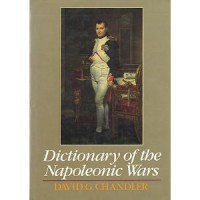
Title: Dictionary of the Napoleonic Wars
Author: David Chandler
Published:
A reference work on the Napoleonic Wars which covers all the important soldiers, sailors, strategies, armaments and battles that shaped Napoleon's career. Includes information on the campaigns led by Napoleon as well as related events such as the Peninsular War.
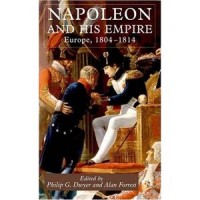
Title: Napoleon and His Empire: Europe, 1804-1814
Author: Philip Dwyer
Published:
Napoleon and His Empire brings together some of the world's leading Napoleonic historians, and is born out of a reflection on the Empire two hundred years after its foundation in May 1804. It provides a timely overview of current trends in research and historiography. It not only revisits traditional themes like Napoleon's revolutionary credentials, the plebiscite for the Empire and the Continental System, but also looks at new research on questions of citizenship, gender, education and local government.
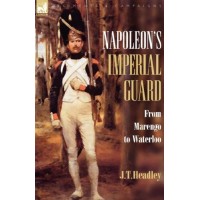
Title: The Imperial Guard of Napoleon: From Marengo to Waterloo (1888)
Author: J. T. Headley
Published: 2007
As with so much of what represented Napoleonic France, the Imperial Guard could trace its existence and spirit back to the Roman Empire of old. Where the Grand Army could look back to affiliate itself with the Legions, the Imperial Guard was nothing less than the Emperor's Praetorians-the elite-the best of the best. Its men coveted their position to the degree that they would often refuse promotion if it meant a transfer to a line regiment. Never squandered, when the Guard advanced it meant the battle was near to its end and victory once more a step away. Their steady presence would put courage into dispirited allied troops and shred the last vestige of morale from an enemy. They represented every branch of the Army and where their magnificent uniforms appeared under their tricolours and eagles, all knew there would also be the Emperor himself. This the story of Napoleon's Imperial Guard from the bearskin caps of the grenadiers to the flamboyance of their mounted chasseurs, their principal characters and the men who commanded them. From Marengo to Waterloo the Imperial Guard created a legend that is unparalleled in modern military history
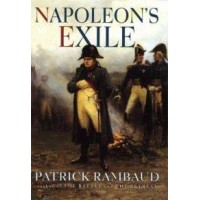
Title: Napoleons Exile
Author: Patrick Rambaud
Published: 2003
The stunning finale to the award-winning Napoleonic trilogy presents the legendary figure as you have never before seen him — exiled and humiliated and vividly real. Patrick Rambaud closes his epic trilogy, which began with The Battle, winner of the Prix Goncourt and the Grand Prix Roman de l’Academie Francaise, and The Retreat. In 1814 Napoleon is racing back to Paris from the debacle of his Russian invasion. A plot afoot in the capital — to return a royal to the throne — succeeds, and Napoleon’s marshals force him to abdicate and go into exile. Octave Senecal, Napoleon’s loyal aide and savior, tells the tale of their journey south through the angry, mob-filled countryside to Elba, a tiny island off the coast of Tuscany. Here Patrick Rambaud brings to life not the Napoleon of the history books, but Napoleon the man — a man horribly bored by exile, gambling with his mother to pass the time, spearing the occasional tuna with local fishermen, and fretting constantly that secret agents and murderers surround him. He is soon planning his escape, while in France his former soldiers spend their evenings drinking to the return of “l’absent.” They won’t have long to wait.

Title: The Retreat
Author: Patrick Rambaud
Published:
A gripping historical novel focused on Napoleon's dramatic invasion of Russia, The Retreat is a stirring follow-up to The Battle, winner of France's Goncourt Prize. The Retreat opens in September 1812, with the French army at the gates of Moscow. Exhausted, famished, and demoralized, they are only a quarter of the 400,000-strong force that crossed the river Niemen three months before. But the sight of this famous city feels like a triumph and a chance, at last, to enjoy a conqueror's spoils. Moscow, however, has been evacuated, and all its supplies removed. Suddenly fires break out, and the burning city becomes a trap. And yet the French stay to pursue their disparate aims amid an air of complete unreality. Henri Beyle -- better known as Stendhal -- goes about his duties as a functionary while thinking of Nero. The soldiers fill their pockets with diamonds but still don't have enough money to buy bread. And all the while, oblivious to their predicament, Napoleon sends to Paris for comic novels and imagines that it is only a matter of time before Tsar Alexander sues for peace. Finally, a month later, the Grande Armee retraces its steps toward the Berezina. Harassed by Cossacks decimated by fighting, the cold, and starvation, the French endure their most brutal test. With the same extraordinary gift for evocation and dramatic power he showed in The Battle, Rambaud brings this disastrous campaign to a brilliant, near-hallucinatory life.
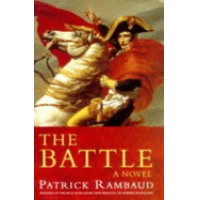
Title: The Battle
Author: Patrick Rambaud
Published:
In 1831, French novelist Balzac began taking notes for a novel of the Battle of Essling (1809), Napoleon's first defeat on the Continent. The narrative would include "not a single woman: only cannon, horses, two armies, uniforms," with Napoleon appearing at a distance, crossing the Danube at the end of the day. Balzac never finished the book, but Rambaud has amply realized his ambition in The Battle, which won the Prix Goncourt and the Grand Prix Roman de l'Acad?mie Fran?aise. Napoleon dominates Rambaud's account: "he detested familiarity and advice: all he desired of his officers, like his courtesans, was mute obedience." Wherever the emperor goes, his household goods go, too: a mountain of linens, china and food, his iron bedstead, carpet, chandeliers, and a round of parmesan cheese to sprinkle on his soup. Future novelist Stendhal is also present as witness to the devastation of this "battle without a victor." Rambaud balances horrific battle set pieces and subtle characterizations to produce what will be a classic
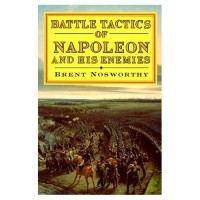
Title: Battle Tactics of Napoleon and His Enemies
Author: Brent Nosworthy
Published: 1998
In this book, Brent Nosworthy provides a wealth of detailed analysis of the various tactical doctrines employed by the main armies of the Revolutionary and Napoleonic period.

Title: The Fall of Napoleon: Volume 1, The Allied Invasion of France, 1813-1814
Author: Michael V. Leggiere
Published: 2007
This book tells the story of the invasion of France at the twilight of Napoleon's empire. With over a million men under arms throughout central Europe, Coalition forces poured over the Rhine River to invade France between late November 1813 and early January 1814. Three principle army groups drove across the great German landmark, smashing the exhausted French forces that attempted to defend the eastern frontier. In less than a month, French forces ingloriously retreated from the Rhine to the Marne; Allied forces were within one week of reaching Paris. This book provides the first complete, English-language study of the invasion of France along a front that extended from Holland to Switzerland.
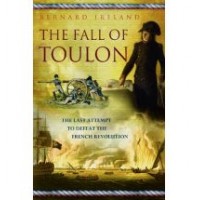
Title: The Fall of Toulon
Author: Bernard Ireland
Published: 2005
The British-led attempt to overthrow the French revolution is a cautionary tale for all attempts at 'regime change'. In the summer of 1793 the surviving French Royalists surrendered the great naval base at Toulon to the British, intending this to be the springboard for a full-scale counter-revolution. A multi-national taskforce led by the British, but including Spanish, Austrian and Italian forces landed in the city. But the Royalists' hopes were dashed: the revolutionaries reacted with great speed and violence. Instead of striking into France the Royalists and their foreign allies are besieged in Toulon. Among the republican forces is a young artillery officer who soon makes a name for himself: Napoleon Bonaparte. The Allied forces botch their withdrawal, a chaotic flight that made the last days of Saigon look orderly. Only a fraction of the Royalists escape with the ships, thousands are massacred in the fall of the city or face the guillotine afterwards. Bernard Ireland's popular and accessible account of the fall of Toulon brings to life a savage episode in European history.
